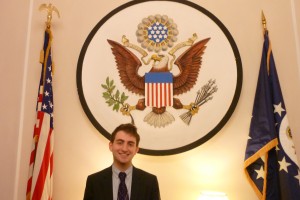This past weekend, the Trinity College Mock Trial program shipped out to the United States Coast Guard Academy for its first invitational of the season. After holding try-outs and accepting eight new mockers in mid-September, Trinity sent two teams of both returning members and new members to the Seventh Annual “Guardian” Invitational in New London, Connecticut. Among these new mockers are first-years Eliza Maciag, Sebastien Broustra, Andrew Miller, and Richard Pizzano, sophomores Anna Bowden and Bobby Boyle, juniors Karla Mardueno and Sonjay Singh, and senior Kaitlin Reedy. Among the competition at “Guardian” were the University of Texas at Dallas, Seton Hall University, Brandeis University, and the U.S. Military Academy.
Hartford to New London was a shorter commute for Trinity than for other teams, so the Gold and Platinum squads both drove to the USCGA each day. The tournament began on Friday the 25th, with the first round of competition taking place at 6pm that evening. Trinity Gold and Platinum both faced teams from all over the country that had been preparing this year’s American Mock Trial Association (AMTA) case. The next day held two rounds, with a final fourth round on Sunday morning. Each day, Trinity Mock Trial argued the case “The State of Midlands v. Whit Bowman.”
As college mock trial’s governing body, AMTA creates a case each year that over 800 teams argue over the course of Invitational preseason during the fall semester, and competition season during the spring semester. Cases rotate between civil and criminal each year; this year’s is a criminal case with a cast of cooky characters. Taking place in an amusement park named Racheter World (Rock-ter World), the defendant Whit Bowman has found himself into trouble after operating a ride called the “Tunnel of Terror” that put a security officer in a coma. All teams must create both a prosecution and defense case theory, and are not told which side they will be arguing until minutes before the trial. Each trial is scored by two “judges” who assign points to each opening statement, direct examination, cross examination, and closing statement. Each judge also ranks four of the six attorneys and four of the six witnesses as first, second, and third place.
Trinity Gold finished the competition strong, with a 5-3-0 win-loss-tie record, while Trinity Platinum finished with a 4-4-0. Despite not bringing home a team win, individuals on Trinity’s two teams brought home three attorney awards. To win an attorney award at this tournament, an attorney needed to score 18 ranks, or be ranked as top attorney at least 3 ballots. Trinity Gold team captain and current team President James Geisler ’14 received a defense attorney award, and Trinity Gold attorney Jhon Pacheco ’14 received a prosecution attorney award. Trinity Platinum team captain and current team Vice President Youlan Xiu ’15 received a defense attorney award as well. With the season off to a strong start, Trinity has every reason to believe that this year will be successful for the program. As always, like the Bantam, “small but mighty.”



